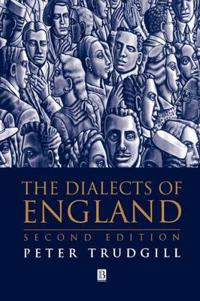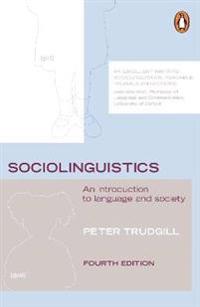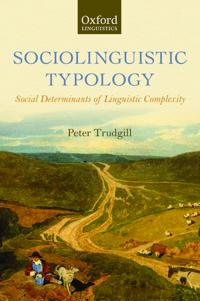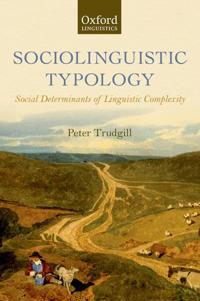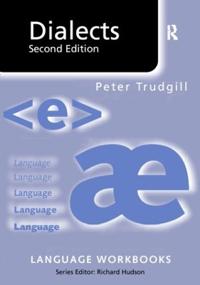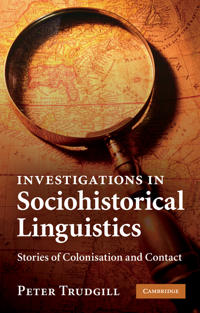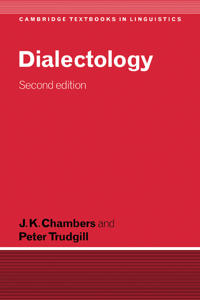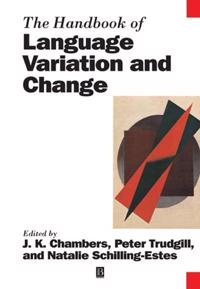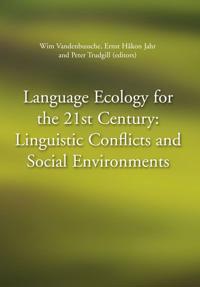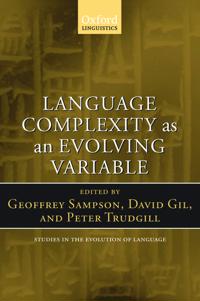The Dialects of England (Häftad)
avPeter Trudgill, Stephen Ed. Trudgill
ISBN: 9780631218159 - UTGIVEN: 200001* Phonetic symbols are included with orthographic representations of speech sounds* Includes many detailed maps which illustrate the origins of various dialects* Celebrates the diversity of English dialects. .[...]
Sociolinguistics (Storpocket)
avPeter Trudgill
ISBN: 9780140289213 - UTGIVEN: 200008This is a classic book on a fascinating subject. Peter Trudgill examines the close link between language and society and the many factors that influence the way we speak. These range from gender, environment, age, race, class, region and politics. Trudgill's book surveys languages and societies from[...]
Sociolinguistic Typology (Inbunden)
avPeter Trudgill
ISBN: 9780199604340 - UTGIVEN: 201110Peter Trudgill looks at why human societies at different times and places produce different kinds of language. He considers how far social factors influence language structure and compares languages and dialects spoken across the globe, from Vietnam to Nigeria, Polynesia to Scandinavia, and from Can[...]
Sociolinguistic Typology (Häftad)
avPeter Trudgill
ISBN: 9780199604357 - UTGIVEN: 201110Peter Trudgill looks at why human societies at different times and places produce different kinds of language. He considers how far social factors influence language structure and compares languages and dialects spoken across the globe, from Vietnam to Nigeria, Polynesia to Scandinavia, and from Can[...]
International English: A Guide to the Varieties of Standard English (Häftad)
avPeter Trudgill, Jean Hannah, Jean Hannah
ISBN: 9780340808344 - UTGIVEN: 2002-04Over the years since first publication in 1982, International English has established its place as the only text which gives a good overview of the linguistics characteristics of varieties of English around the world. In order to keep up with research that has been conducted over the past 6 years, a[...]
International English (Häftad)
avPeter Trudgill, Jean Hannah
ISBN: 9780340971611 - UTGIVEN: 200805From Scotland to Singapore, Canada to the Channel Islands, Namibia to New Zealand and beyond, International English takes you on a fascinating journey through the varieties of Standard English spoken around the world. Comparisons across the varieties provide a comprehensive guide to differences in [...]
Dialects (Inbunden)
avPeter Trudgill
ISBN: 9780415342629 - UTGIVEN: 2004-07-29Dialects introduces the many dialects of English spoken in the United Kingdom and reveals the key issues that dialectology engages with.[...]
Dialects (Häftad)
avPeter Trudgill
ISBN: 9780415342636 - UTGIVEN: 200407Routledge Language Workbooks provide absolute beginners with practical introductions to core areas of language study. Books in the series provide comprehensive coverage of the area as well as a basis for further investigation. Each Language Workbook guides the reader through the subject using 'hands[...]
Investigations in Sociohistorical Linguistics (Häftad)
avPeter Trudgill
ISBN: 9780521132930 - UTGIVEN: 201009In the last five hundred years or so, the English language has undergone remarkable geographical expansion, bringing it into contact with other languages in new locations. It also caused different regional dialects of the language to come into contact with each other in colonial situations. This boo[...]
Dialectology (Häftad)
avJ. K. Chambers, Peter Trudgill
ISBN: 9780521596466 - UTGIVEN: 199812When first published in 1980, Dialectology broke new ground by integrating urban dialectology (sociolinguistics), dialect geography and spatial variation into a cohesive discipline. In this second edition, the authors take account of the renaissance of dialect research in the last twenty years. They[...]
New-Dialect Formation (Häftad)
avPeter Trudgill
ISBN: 9780748618774 - UTGIVEN: 2006-01This book presents a new and controversial theory about dialect contact and the formation of new colonial dialects. It examines the genesis of Latin American Spanish, Canadian French and North American English, but concentrates on Australian and South African English, with a particular emphasis on t[...]
The Handbook of Language Variation and Change (Häftad)
avEditor:J. K. Chambers, Editor:Peter Trudgill, Schilling-E
ISBN: 9781405116923 - UTGIVEN: 200312The Handbook of Language Variation and Change,written by a distinguished international roster of contributors, reflects the vitality and growth of the discipline in its multifaceted pursuits. It is a convenient, hand--held repository of the essential knowledge about the study of language variation a[...]
English Accents and Dialects: An Introduction to Social and Regional Varieties of English in the British Isles (Häftad)
avArthur Hughes, Peter Trudgill, Dominic Watt
ISBN: 9781444121384 - UTGIVEN: 201204English Accents and Dialects is an essential guide to contemporary social and regional varieties of English spoken in the British Isles today. Together with invaluable overviews of numerous regional accents and dialects, this fifth edition provides a detailed description of key features of Received [...]
Language ecology for the 21st century; linguistic conflicts and social environments (Inbunden)
avWim Vandenbussche, Ernst Håkon Jahr, Peter Trudgill
ISBN: 9788270997480 - UTGIVEN: 2013-01Einar Haugen's theory of language ecology is considered by many to mark the finest hour of one of the greatest linguists of our times. This volume seeks to explore the continued value and applicability of Haugen's ecolinguistic views, both in the development of current sociolinguistic theory and pra[...]
Language Complexity As an Evolving Variable (Pocket)
avGeoffrey (EDT) Sampson, David (EDT) Gil, Peter (EDT) Trudgill
ISBN: 9780199545223 - UTGIVEN: 2009-05This book presents a challenge to the widely-held assumption that human languages are both similar and constant in their degree of complexity. For a hundred years or more the universal equality of languages has been a tenet of faith among most anthropologists and linguists. It has been frequently ad[...]

